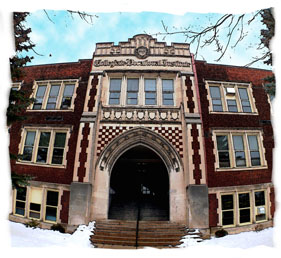About the International Baccalaureate Organization
The International Baccalaureate (IB) was founded in Geneva, Switzerland in 1968. The International Baccalaureate Organization is a non-profit educational foundation that offers four programmes for students ages 3-19. The Diploma Programme, offered in Grades 11 and 12, is the program GCVI is authorized to offer.
The pedagogy was established and designed with the expansion of human abilities, character and moral development attributes in mind. Such focused education has been gaining ground in recent years because of its practical orientation in the face of rapidly changing technical scenarios, advancement of human thoughts, mindset and hands-on approach towards practical, application orientated learning.
These approaches to learning (ATLs) develop a different frame of mind and in turn, students become not just dedicated learners, but also the discoverers of the power of ‘Self’ and truthful citizens of the world.
IB is a world-leading curriculum, it fosters creativity, encourages inquiry, action and collaborative reflection-based learning to develop a range of competencies and become active, compassionate lifelong learners. This frame of mind generates harmony, understanding that other people, with their differences, may also be right.
The IB aims to cultivate in students the mindset, determination and will to create a better world. Its rigorous and international programmes develop knowledge and skills essential for an informed, engaged and meaningful life in the 21st century.
GCVI – An IB World School
 GCVI is officially an IB World School. What does this mean? We have joined a community of over 4,200 like-minded public and private schools around the world that value international mindedness and aim to foster in students a sense of social and environmental responsibility.
GCVI is officially an IB World School. What does this mean? We have joined a community of over 4,200 like-minded public and private schools around the world that value international mindedness and aim to foster in students a sense of social and environmental responsibility.
In addition, being an IB World School means providing students with the opportunity to pursue a variety of post-secondary programs ranging from the Sciences to the Fine Arts. The breadth of the program keeps local and international university doors open.
What Is the IB Diploma Programme?
Slide deck created by the IB
About the IB Diploma Programme
The IB Diploma Programme (DP) is an academically challenging and balanced programme of education with final examinations that prepares students, aged 16 to 19, for success at university and life beyond. It has been designed to address the intellectual, social, emotional and physical well-being of students. The programme has gained recognition and respect from the world’s leading universities.
The Diploma Programme prepares students for effective participation in a rapidly evolving and increasingly global society as they:
- develop physically, intellectually, emotionally and ethically
- acquire breadth and depth of knowledge and understanding, studying courses from 6 subject groups
- develop the skills and a positive attitude toward learning that will prepare them for higher education
- study at least two languages and increase understanding of cultures, including their own
- make connections across traditional academic disciplines and explore the nature of knowledge through the programme’s unique theory of knowledge course
- undertake in-depth research into an area of interest through the lens of one or more academic disciplines in the extended essay
- enhance their personal and interpersonal development through creativity, action and service
The Diploma Programme Core
- The extended essay asks students to engage in independent research through an in-depth study of a question relating to one of the DP subjects they are studying. The world studies extended essay option allows students to focus on a topic of global significance which they examine through the lens of at least two DP subjects.
- Theory of knowledge develops a coherent approach to learning that unifies the academic disciplines. In this course on critical thinking, students inquire into the nature of knowing and deepen their understanding of knowledge as a human construction.
- Creativity, activity, service (CAS) involves students in a range of activities alongside their academic studies throughout the Diploma Programme. Creativity encourages students to engage in the arts and creative thinking. Action seeks to develop a healthy lifestyle through physical activity. Service with the community offers a vehicle for new learning with academic value. The three strands of CAS enhance students’ personal and interpersonal development through experiential learning and enable journeys of self-discovery.
For more information, please visit www.ibo.org
